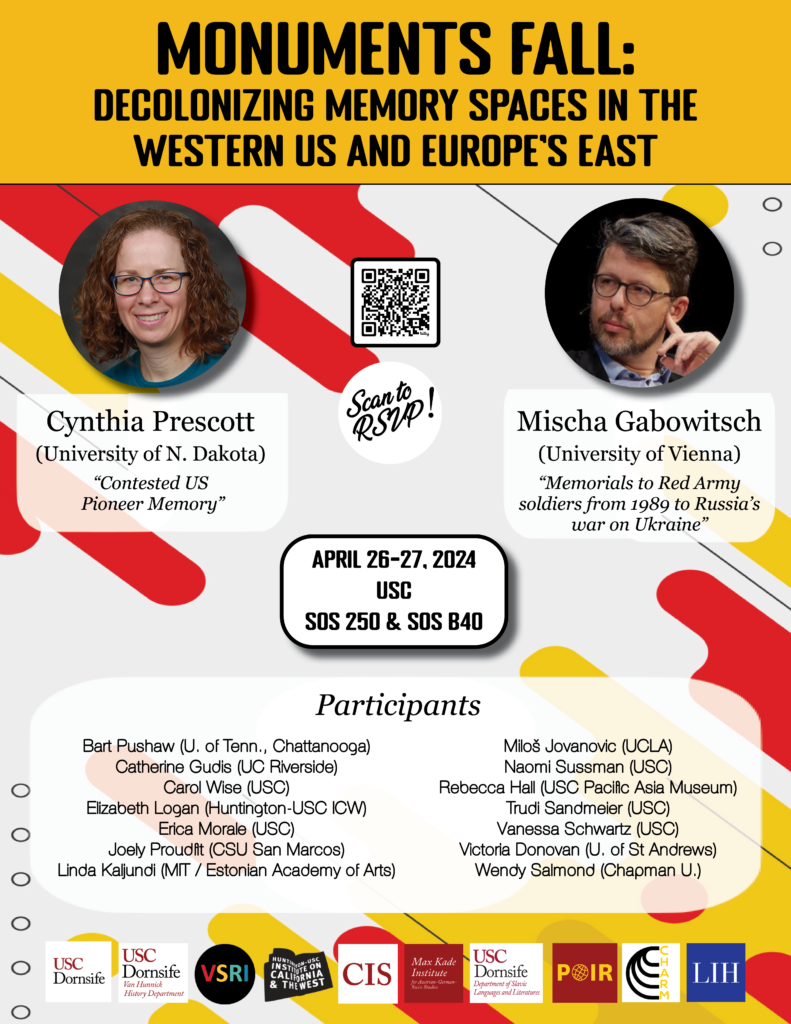
To RSVP, please visit:www.bit.ly/monumentsfallOr scan the QR Code ⇒
|
 |
Since February 2022, Russia’s full scale invasion of Ukraine has brought new attention to the legacy of colonialism in European sites of memory, (and within the less explored frontier of the former Soviet Empire). Much like in Western Europe and the United States in 2020, calls to decolonize public spaces have led to the dismantling of monuments in Ukraine, Poland, Finland, the Baltics, among other countries. Unlike in the West , the dynamics of iconoclasm have been very different. In Ukraine, occupying Russian forces have reinterpreted the meanings of war memorials to align with the ideology that underpins their war aims.
Similarly, Ukrainians have reclaimed the Soviet WW2 memorials back by vernacularizing and domesticating them in the Baltics, the removal of WW2 memorials, and the initiatives to remove all other Soviet symbols from public space has been met with criticism from historians, political scientists, sociologists, heritage, and architecture professionals, as well as from diverse segments of the local Russian speaking community. Determining which monuments symbolize “a colonial legacy” and which can be considered benign has turned out to be quite different and surprisingly complex, when many WW2 monuments have been designed by local artists, constructed in local vernacular styles, and commemorating events significant for the local collective memory (this holds particularly true for Ukraine).
The decolonization of public space now gripping Eastern Europe poses a challenge to global, and in particular, Anglophone discussions around decolonization and colonial legacies. In the wake of the Russian war in Ukraine, increasing numbers of right-wing and nationalist Eastern European politicians use a rhetoric of decolonization to justify controversial policies around public space, but also memory politics and citizenship rights.
This two-day workshop seeks to survey debates over colonialism and commemoration across Eastern Europe and put them in conversation with debates over the fate of monuments in the United States that have been reenergized since 2020. How are certain monuments deemed colonial in origin? What kinds of strategies have been used to deal with colonial monuments? How do certain aesthetic, spatial, and representational techniques become signifiers of colonial power? And how can the fight over the fate of monuments in Eastern Europe inform the broader conversation over the decolonization of public space in the global North?
Schedule
Friday, April 26th, 2024
SOS 250
9:00-9:45AM – Registration and Coffee
9:45-10:00AM – Opening Remarks: Aro Velmet (USC)
10:00-11:20AM – Panel 1: Politics and Contested Memories
Elizabeth Logan (Huntington-USC Institute of California and the West)
Linda Kaljundi (MIT and Estonian Academy of the Arts)
Discussant: Mischa Gabowitsch (University of Vienna)
11:30-1:00PM – Panel 2: Museums and Difficult Objects
Rebecca Hall (USC Pacific Asia Museum)
Wendy Salmond (Chapman University)
Discussant: Erica Camisa Morale (USC)
1:00-2:00PM – Lunch
2:00-3:20PM – Panel 3: Rethinking Urban Spaces
Miloš Jovanović (UCLA)
Catherine Gudis (UCR)
Discussant: Vanessa Schwartz (USC)
SOS B40
4:00-6:00PM – Keynote Lecture
Cynthia Prescott (University of North Dakota)
Contested US Pioneer Memory
Response by Mischa Gabowitsch (University of Vienna)
Saturday, April 27th, 2024
Downtown Los Angeles
9:00-11:00AM – Tour of the El Pueblo de Los Angeles Historical Monument
Edgar Garcia (City of Los Angeles)
11:00-1:00PM – Lunch and Return to USC
SOS 250
1:00-2:20PM – Panel 4: Indigenous Presences and Absences
Joely Proudfit (CSU San Marcos)
Bart Pushaw (U of Tennessee-Chattanooga)
Discussant: Naomi Sussmann (USC)
2:30-3:50PM – Panel 5: Universities and Museums as Participants
Trudi Sandmeier (USC)
Victoria Donovan (University of St Andrews)
Discussant: Carol Wise (USC)
SOS B40
4:00-6:00PM – Keynote Lecture
Mischa Gabowitsch (University of Vienna)
Iconoclasm, Reconstruction, Appropriation: Memorials to Red Army soldiers from 1989 to Russia’s war on Ukraine
Response by Cynthia Prescott (University of North Dakota)